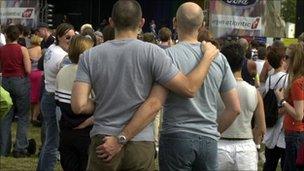Gay men 'report higher cancer rate than straight men'
- Published

Gay men are twice as likely to have had cancer, a study says
Homosexual men are more likely to have had cancer than heterosexual men, a US study has suggested.
The study of more than 120,000 people in California has led to calls for more specialist support.
Lesbians and bisexual women also had poorer health after cancer than heterosexuals, according to research published in the journal Cancer.
Cancer Research UK said more research was needed as the reasons for any difference were unclear.
In the 2001, 2003 and 2005 California Health Interview surveys, a total of 3,690 men and 7,252 women said they had been diagnosed with cancer at some point in their lives.
Out of the 122,345 people interviewed, 1,493 men and 918 women described themselves as gay, while 1,116 women said they were bisexual.
Gay men were twice as likely to have been diagnosed with cancer as straight men and, on average, it happened a decade earlier.
There was no such link in women.
Survival or risk?
The survey interviews "survivors" so is not a true representation of the number of cancer cases.
Some patients will have died before the survey and others would have been too ill to take part.
Dr Ulrike Boehmer, from the Boston University School of Public Health, said it was not possible to conclude "gay men have a higher risk of cancer" because the underlying reasons for the higher incidence could be more complicated.
Further research would be needed to determine if homosexual men were actually getting more tumours or had greater survival rates, she said.
The authors speculate that the difference in the numbers of cancer survivors could be down to the higher rate of anal cancer in homosexual men or HIV infection, which has been linked to cancer.
Jason Warriner, clinical director for HIV and sexual health at the Terrence Higgins Trust, said: "We know that HIV can cause certain types of cancer, and that gay men are at a greater risk of HIV than straight men.
"Another factor potentially having an impact is Human Papilloma Virus, which can lead to anal cancer in gay men.
"The government currently runs a national vaccination programme for young girls, but we think recent figures on oral and anal cancers justify taking another look at whether the programme should be extended to include boys."
Jessica Harris, senior health information officer at Cancer Research UK, said: "There is already evidence of some health inequalities as a result of sexuality, for example, smoking rates are higher in homosexual men and women than in heterosexual people.
"In this Californian survey, gay men were more likely than straight men to say they had been diagnosed with cancer, but it's not clear from this study why this might be.
"It could be down to better survival or higher rates of cancer among gay men and we'd need larger studies that take both of these factors into account to find out."
Psychological health
Looking at the health of patients who survived cancer also showed differences based on sexual orientation.
Lesbian and bisexual women were more than twice as likely as heterosexual women to say they were in "fair or poor health".
This effect did not appear in men.
Dr Boehmer said: "One common explanation for why lesbian and bisexual women report worse health compared to heterosexual women is minority stress [which] suggests lesbian and bisexual women have worse health, including psychological health due to their experiences of discrimination, prejudice, and violence."
She called for more services to "improve the well-being of lesbian and bisexual cancer survivors" and for programs which "focus on primary cancer prevention and early cancer detection" in homosexual men.